Sample A: Cover Page of Thesis, Project, or Dissertation Proposal
Sample A: Cover Page of Thesis, Project, or Dissertation Proposal
Sample A: Cover Page of Thesis, Project, or Dissertation Proposal
You also want an ePaper? Increase the reach of your titles
YUMPU automatically turns print PDFs into web optimized ePapers that Google loves.
dialogic reading techniques as cost- and time-efficient techniques f<strong>or</strong> increasing<br />
children‘s literacy skills within preschool contexts.<br />
Unlike the research <strong>of</strong> Whitehurst et al. (1994, 1999), intervention methods in the<br />
current study were only implemented in the preschool classroom context and only<br />
included the dialogic reading component (versus Whitehurst et al.‘s (1994, 1999)<br />
implementation <strong>of</strong> dialogic reading and a phonemic program in the classroom context).<br />
Also, whereas Whitehurst et al.‘s control group followed the regular Head Start<br />
curriculum, the book reading control group in the current study read emotion-laden<br />
st<strong>or</strong>ybooks in addition to the regular Head Start curriculum. Thus, the current study<br />
included a stricter test <strong>of</strong> dialogic reading effects on children‘s vocabulary skills because<br />
children assigned to the book reading control group in the current study participated in<br />
the regular Head Start curriculum as well as additional weekly st<strong>or</strong>ybook readings.<br />
Regarding emotion knowledge, children attending half-day Head Start classrooms<br />
assigned to the intervention group demonstrated the greatest affective perspective taking<br />
skills <strong>of</strong> all groups following intervention implementation. Children attending full-day<br />
Head Start classrooms assigned to the intervention group, however, demonstrated the<br />
least affective perspective taking skills <strong>of</strong> all groups. Perhaps the addition <strong>of</strong> dialogic<br />
reading with emotional st<strong>or</strong>ybook content to the full-day classroom schedule was too<br />
taxing f<strong>or</strong> children. Asking dialogic reading questions may have made readings too<br />
lengthy compared to reading st<strong>or</strong>ybooks as usual (as did teachers in the book reading<br />
control group), consequently leading to children‘s disengagement from st<strong>or</strong>ybook reading<br />
participation and thus not gaining social-emotional benefits. Also, children in half-day<br />
127



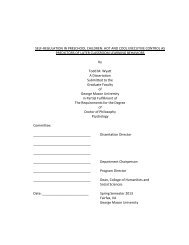
![[Sample B: Approval/Signature Sheet] - George Mason University](https://img.yumpu.com/21978828/1/190x245/sample-b-approval-signature-sheet-george-mason-university.jpg?quality=85)

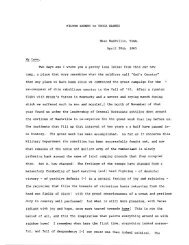
![[Sample B: Approval/Signature Sheet] - George Mason University](https://img.yumpu.com/18694905/1/190x245/sample-b-approval-signature-sheet-george-mason-university.jpg?quality=85)
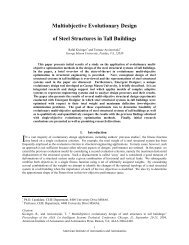

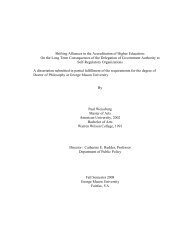
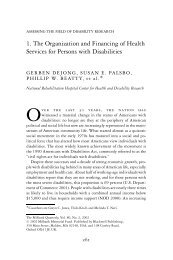
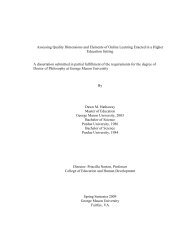
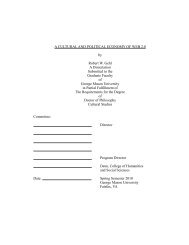
![[Sample B: Approval/Signature Sheet] - George Mason University](https://img.yumpu.com/18694552/1/189x260/sample-b-approval-signature-sheet-george-mason-university.jpg?quality=85)
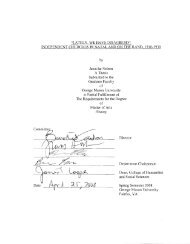
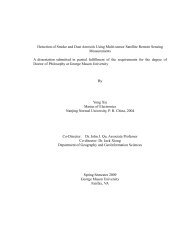
![[Sample B: Approval/Signature Sheet] - George Mason University](https://img.yumpu.com/18694474/1/190x245/sample-b-approval-signature-sheet-george-mason-university.jpg?quality=85)